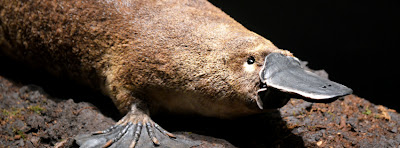One of the extremely few mammals that lay eggs, the platypus is a monotreme, which are indigenous to Australia and New Guinea.
They're quite unique from the very beginning. Baby platypus grow a "spike" on their bills that they use to hatch their own egg. A time after they're born, their 'egg spikes' fall off. That's only one highly unique attribute of the platypus that I learned when recently visiting "Extreme Mammals" at the Fernbank Museum of Natural History.
These adorable creatures—in their own sense—were baffling to the scientists who first discovered them. Their "egg-laying, duck-billed, beaver-tailed, and otter-footed" appearance gave some pause, thinking that perhaps that this creature was a hoax.
And speaking of sense, platypus have a "sixth sense." They can detect electrical current, which helps them find food. Animals—including you and I—give off electrical energy. That electrical energy is detectable by the platypus and helps it find food—other animals—even when not in sight.
I could go on and on and on...the platypus is such a fascinating creature! But I'll leave it to you to check out "Extreme Mammals" at Fernbank. The exhibition is running through August 2013, but of course I recommend going early—you know what happens when we wait too long!
I can't express how ultra-cool I think it is that we have these kinds of opportunities in Atlanta...to learn about so many wondrous things at places like the Fernbank Museum of Natural History! There are LOTS of animals in the exhibition about which to learn. Allot plenty of time to explore...I'm pretty sure you'll be glad you did.
They're quite unique from the very beginning. Baby platypus grow a "spike" on their bills that they use to hatch their own egg. A time after they're born, their 'egg spikes' fall off. That's only one highly unique attribute of the platypus that I learned when recently visiting "Extreme Mammals" at the Fernbank Museum of Natural History.
 |
| Platypus at the Fernbank Museum of Natural History |
And speaking of sense, platypus have a "sixth sense." They can detect electrical current, which helps them find food. Animals—including you and I—give off electrical energy. That electrical energy is detectable by the platypus and helps it find food—other animals—even when not in sight.
I could go on and on and on...the platypus is such a fascinating creature! But I'll leave it to you to check out "Extreme Mammals" at Fernbank. The exhibition is running through August 2013, but of course I recommend going early—you know what happens when we wait too long!
I can't express how ultra-cool I think it is that we have these kinds of opportunities in Atlanta...to learn about so many wondrous things at places like the Fernbank Museum of Natural History! There are LOTS of animals in the exhibition about which to learn. Allot plenty of time to explore...I'm pretty sure you'll be glad you did.

No comments:
Post a Comment